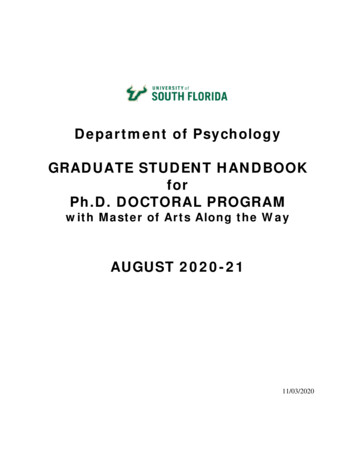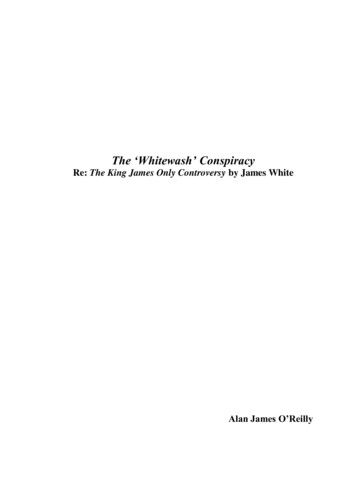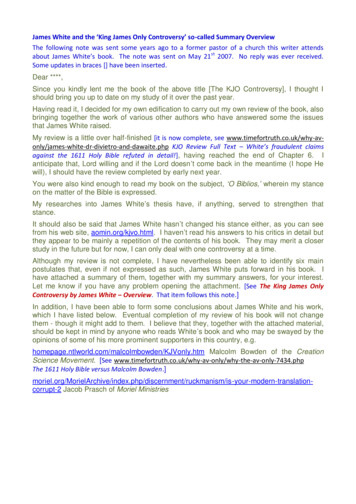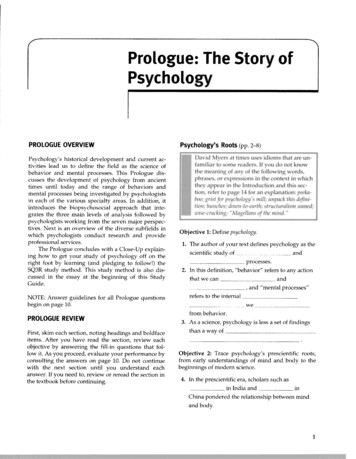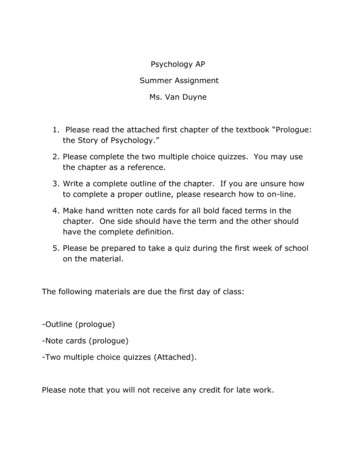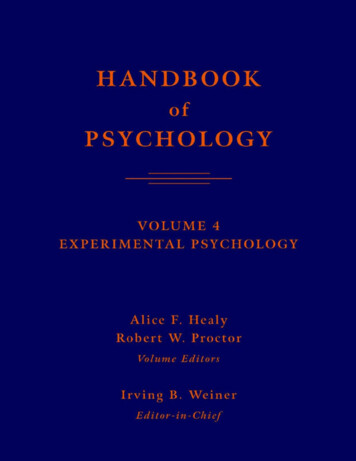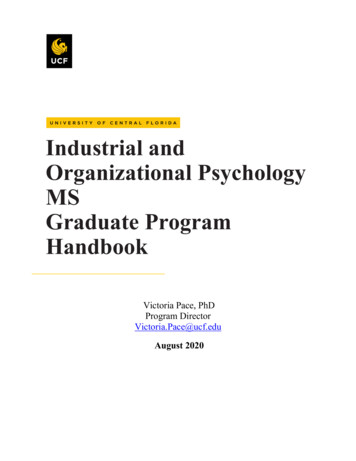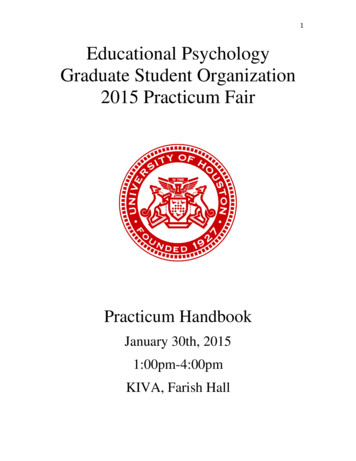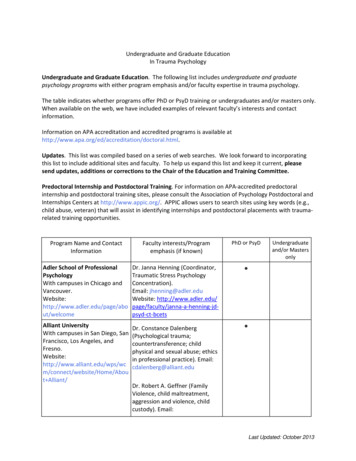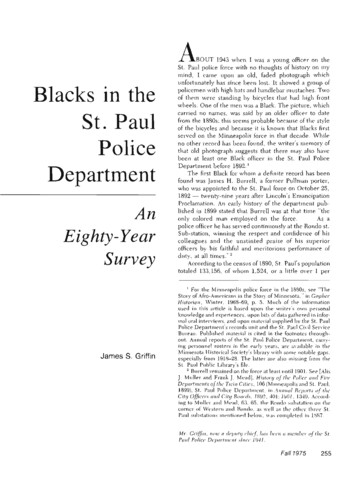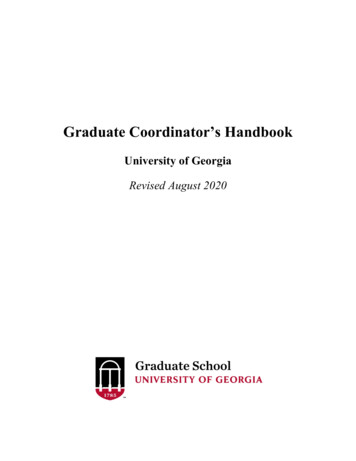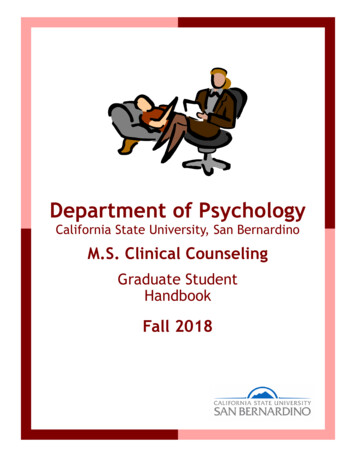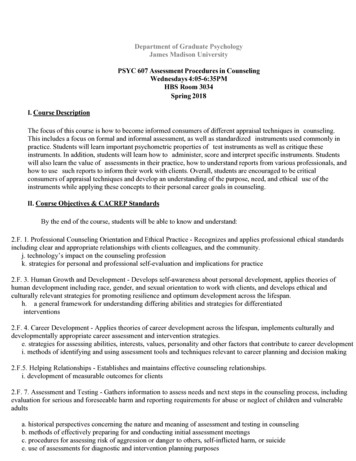
Transcription
Department of Graduate PsychologyJames Madison UniversityPSYC 607 Assessment Procedures in CounselingWednesdays 4:05-6:35PMHBS Room 3034Spring 2018I. Course DescriptionThe focus of this course is how to become informed consumers of different appraisal techniques in counseling.This includes a focus on formal and informal assessment, as well as standardized instruments used commonly inpractice. Students will learn important psychometric properties of test instruments as well as critique theseinstruments. In addition, students will learn how to administer, score and interpret specific instruments. Studentswill also learn the value of assessments in their practice, how to understand reports from various professionals, andhow to use such reports to inform their work with clients. Overall, students are encouraged to be criticalconsumers of appraisal techniques and develop an understanding of the purpose, need, and ethical use of theinstruments while applying these concepts to their personal career goals in counseling.II. Course Objectives & CACREP StandardsBy the end of the course, students will be able to know and understand:2.F. 1. Professional Counseling Orientation and Ethical Practice - Recognizes and applies professional ethical standardsincluding clear and appropriate relationships with clients colleagues, and the community.j. technology’s impact on the counseling professionk. strategies for personal and professional self-evaluation and implications for practice2.F. 3. Human Growth and Development - Develops self-awareness about personal development, applies theories ofhuman development including race, gender, and sexual orientation to work with clients, and develops ethical andculturally relevant strategies for promoting resilience and optimum development across the lifespan.h. a general framework for understanding differing abilities and strategies for differentiatedinterventions2.F. 4. Career Development - Applies theories of career development across the lifespan, implements culturally anddevelopmentally appropriate career assessment and intervention strategies.e. strategies for assessing abilities, interests, values, personality and other factors that contribute to career developmenti. methods of identifying and using assessment tools and techniques relevant to career planning and decision making2.F.5. Helping Relationships - Establishes and maintains effective counseling relationships.i. development of measurable outcomes for clients2.F. 7. Assessment and Testing - Gathers information to assess needs and next steps in the counseling process, includingevaluation for serious and foreseeable harm and reporting requirements for abuse or neglect of children and vulnerableadultsa. historical perspectives concerning the nature and meaning of assessment and testing in counselingb. methods of effectively preparing for and conducting initial assessment meetingsc. procedures for assessing risk of aggression or danger to others, self-inflicted harm, or suicidee. use of assessments for diagnostic and intervention planning purposes
f. basic concepts of standardized and non-standardized testing, norm-referenced and criterion-referenced assessment,and group and individual assessmentsg. statistical concepts, including scales of measurement, measures of central tendency, indices of variability, shapes andtypes of distributions, and correlationsh. reliability and validity in the use of assessmentsi. use of assessments relevant to academic/educational, career, personal, and social developmentj. use of environmental assessments and systematic behavioral observationsk. use of symptom checklists, and personality and psychological testingl. use of assessment results to diagnose developmental, behavioral, and mental disordersm. ethical and culturally relevant strategies for selecting, administering, and interpreting assessment and test results2.F. 8. Research and Program Evaluation - Critically evaluates research related to core areas of counseling practice. Usesdata-informed decision-making practices for program evaluation and management.a. the importance of research in advancing the counseling profession, including how to critique research to inform counselingpracticec. needs assessmentsh. statistical methods used in conducting research and program evaluationCourse content and assignments will also address the following Clinical Mental Health Counseling standards: Psychological tests and assessments specific to clinical mental health counseling. 1. Foundations e. Intake interview, mental status evaluation, biopsychosocial mental health history, and psychological assessment fortreatment planning and caseload management. 3. Practice a. JMU Counseling Program Key CMCH Standards: Demonstrate the knowledge and skills necessary to address awide variety of circumstances within the context of clinical mental health counseling. Applying evidence-basedinterventions for prevention and treatment of a broad range of mental health issues, graduates also demonstrate skillsfor social justice and advocacy. 9. CMHCCourse content and assignments will also address the following School Counseling standards: Assessments specific to P-12 education. G.1.e. Design and evaluation of school counseling programs G.1.3.b Use of accountability data to inform decision making G.1.3.n Use of data to advocate for programs and students G.1.3.oIII. Required TextsDrummond, R. J., Sheperis, C. J., & Jones, K. D. (2016). Assessment procedures for counselors andhelping professionals (8th ed.). Pearson.ISBN-13: 978-0132850636ISBN-10: 013285063XIV. Recommended TextsAmerican Psychiatric Association. (2013). Diagnostic and statistical manual of mental disorders (5th ed.).
Washington, DC.V. Course Format1.Class Structure Class sessions will include a combination of the following:a. Business: Any issues left from the previous class, announcements, and the overview of topics to becovered during class;b. Lecture and Discussion;c. Exercises and Experiential Activities;2. Class Participation and Student Conduct Each student is expected to attend ALL class meetings. If you feelthat there are circumstances that will inhibit your ability to be fully present for this class, please let me know assoon as the situation arises, so that I can coordinate with you taking the course at a time when you can besuccessful.Cell phone use, texting, and use of the internet will not be allowed during class. The following consequences ofwill occur if you choose to engage in disruptive behavior: (a) first I will ask you, privately, to stop, and (b) second,you will be dismissed for the remainder of the class.Cell phones: Turn off or switch to vibrate all cell phones during class time.I prefer students not use laptops during classes. While you may be perfectly responsible in the use of your laptopfor note-taking, it is shown that even the use of one laptop in a class creates what is referred to as a “cone ofdistraction” for those in the vicinity and hand-written notes are more beneficial in terms of memory.The course is designed to be student-centered which means active participation is critical. It is expected that all studentswill come to class prepared. This also means completing all assigned readings before coming to class.Expectations for Class Participation: As your instructor, I expect “Excellent Participation” as defined below. Poorparticipation will not be tolerated and students will be dismissed for the remainder of the class.Display of Professionalism: Licensure as a Professional Counselor carries with it a great deal of responsibility. Whethera counselor is helpful, ineffective, or even harmful pertains primarily to issues of competence and professionalism. It isassumed that a counseling student’s behavior in class is generally an indicator of his or her future behavior as a counselor.Thus, students are appraised based on professionalism displayed during class. Counseling students displayprofessionalism, and build competence by arriving on time for class, by engaging fully in class lectures and activities, andby demonstrating professional attitudes, and professional character. These factors are evaluated based on one's ability toconvey warmth, genuineness, respect, and empathy in interactions with classmates, and the instructor. Students need to beable to demonstrate the ability to accept and integrate feedback, be aware of their impact on others, accept personalresponsibility, and be able to express feelings 00)(80-90)(79 and under)Attends every class, arrivespromptly, and is well prepared,having completed all assignments.Interacts respectfully andempathically with other membersIs absent or, when present, rarelyinteracts with other members ofthe class. Comes to classunprepared. Demonstrates anotable lack of interest inConsistently engages, activelylistens, and builds on thecontributions of other membersof the class. Arrives promptlyand fully prepared at every class
session. Can always be countedon to offer honest reflections,insightful observations, andempathic comments thatcontribute significantly to astimulating learningenvironment. Welcomesfeedback and brings a sense ofpresence that stimulatesproductive group dynamicswithout dominating the process.of the class. Regularly contributesthoughtful reflections, relevantcomments, and constructiveobservations to class discussions.Is open to feedback and brings asense of presence that contributesto productive group dynamics.contributing to a positive learningenvironment. Brings a presencethat sabotages productive groupdynamics. Engages in non- verbalrelational aggression, such as eyerolling and dismissive gestures,that communicates disrespect orcontempt for peers and theinstructor.VI . Course Requirements1. Given the amount of learning involved in class, your attendance is critical to successful completionof the course;2. Actively participate in weekly discussions, activities, and course assignments;3. Act and present yourself in a professional manner;4. Complete all indicated readings and written assignments;5. Actively and openly communicate so that we can make this course a learning experience for all of us.VII. GradingThe grade you receive for each assignment, and for the course, is the grade you earn. In order to pass this course, allassignments must be completed in alignment with the guidelines below. If you have questions about grading, youmust see the course instructor as your questions arise; not after you have handed in your work or earned your grade.Please stay very close to the page limit. If papers far exceed page limit, I may ask you to revise.Written WorkAll written work must be typed and follow APA format. Every document you submit needs to include a title page.Graduate level work needs to be typed double-spaced on one side of a page. Assignments that do not follow thisestablished criterion will be given back to the student to do again.Writing style should be formal, without use of contractions, slang, or abbreviations. The guide for the style is thePublication Manual of the American Psychological Association, (6th ed.). You may visit http://www.apastyle.org/ 01/ for more information. Be sure to carefully proof read all workbefore submitting it for evaluation. Students are expected to display good writing skills in all written work.Late AssignmentsAssignments will be penalized ten (10) points for each late day. Assignments will not be accepted afterfive (5) days and will average as a “zero.” Students can view assignment due dates in the syllabusitinerary, as well as the course web site.
AssignmentsJournal ReflectionsPersonal AssessmentProject: Group Design,Classroom Guidance, orInterventionMultidisciplinary TeamAttendance& Reflection PaperParticipation andProfessionalismPoints130200Final GradeA 100-90 points“given for excellent work”B 89-80 points“meets Graduate College expectations”100C 79-70“work below Graduate College expectations”100D 69-60“work significantly below averagequality and indicates that the coursemust be retaken”F 59 and below“indicates failure and means the class must betaken again with a passing grade before creditis allowed”Midterm Exam100Final Exam100730Final Grade (points earned/730)*100
Assignment OverviewSemi-Structured Reflection Journals (130 points)Assessment is often a topic that students struggle to integrate into their view ofthemselves as a counselor at first. During the course of the semester you will haveweekly opportunities to reflect on the various topics and how they relate to yourclinical experiences and evolving view of self. Each week, you are to post a reflectivejournal entry onto Canvas, detailing your reaction to the readings as well as the classsession. Creativity is strongly encouraged, while also remaining true to the reflectiveand educational purpose. Journal entries (13 @ 10 points each) are due eachWednesday by 11:59PM.Personal Assessment Project & Rubric (200 points)This project is your opportunity to create genuine personal and professional meaningfrom your experience in this class. You will each have a choice as to whether to designa group, a classroom guidance activity/series, an initiative, or an intervention protocolwith your population and setting of interest. This will culminate in a manual/guide tobe submitted by the last week of class. Your project should include a research basedrationale as well as a mechanism/assessment for measuring outcomes or impact. Thisproject will be a regular part of our classroom discussion. All ideas will be entertainedwith the hope that you’ll be able to find something relevant to your work and to thisclass as well as exciting to your heart.Consider the following concepts as necessary to guide a successful product:1. Identify an issue, behavior, problem, or diagnosis to be addressed.2. Identify a specific population and setting.3. Identify an assessment instrument that will help you measure the outcomes of thisexperience. You may wish to include information regarding your assessment inyour research write-up (at least say what the instrument is and why you are usingit there) and/or in your manual/guide/poster/PowerPoint (whatever format you usefor your project). Sample write up for an assessment instrument (this is the typeof information you will find in the mental measurements yearbook or manual)located at the end of the syllabus.4. Identify a format (i.e. a group, a program, or anindividual/couples/family intervention).5. Identify research supporting your choice of issue and population (5 sourcesminimum, about 3 pages in length).What is the scope of the problem/topic?/ Whatneed will your intervention address?/What made you choose this topic What does the previous literature on the topic say?Have others used assessment to measure outcomes related to this topic?In terms of your assessment measure, what type of information are youlooking for?6. Develop clear goals and objectives.7. Discuss anticipated outcomes.
Multidisciplinary Team Participation & Reflection (100 points)Each student will identify a multidisciplinary team either at your internship orpracticum site or a meeting identified through one of JMU’s partner organizations. Youwill attend at least one meeting for the purpose of: a) identifying the variousprofessionals who have roles on the team and what purpose they serve; b) identifyingthe various ways in which the professional conceptualize the cases presented and thecontributions of each point of view; c) identifying the various assessments and reportsthat are used to aid in case conceptualization; d) discuss how cases were presented andinterpreted; e) discuss your view on the process with attention to the assessments usedand your view of those; and f) critically examine the process through the eyes of acounselor and discuss the strengths, weaknesses, and any suggestions you would haveas to how to better assess client needs.Compile a reflection paper (2-5 pages in length) detailing your experience as well asyour thoughts, feelings, reactions various steps in the process. This paper shouldreflect your ability to integrate this experiences, course material, and your ownexperience as a counselor. Please be sure to follow APA format, including anintroductory paragraph, appropriate section headings, and any resources.NOTE: If you are not sure how to connect with a multidisciplinaryteam, see the instructor and we’ll find a good option for you. Be sure tostart EARLY.University and Department PolicyAdding/Dropping ClassesAs mature and conscientious students, you know that you are responsible for registering forclasses and for verifying your class schedules on e-campus. Obviously, you must register forclasses or drop classes before the scheduled add/drop deadline. For more details, you can refer tothe Registrar's Web site at http://www.jmu.edu/registrar/.Academic Honesty:Making references to the work of others strengthens your own work by granting you greaterauthority and by showing that you are part of a discussion located within an intellectualcommunity. When you make references to the ideas of others, it is essential to provide properattribution and citation. Failing to do so is considered academically dishonest, as is copying orparaphrasing someone else’s work. The consequences of such behavior could range from failureon an assignment to failure in the course to dismissal from the University.Because the disciplines of the Humanities value collaborative work, you will be encouraged toshare ideas and to include the ideas of others in our papers. Please ask if you are in doubt aboutthe use of a citation. Honest mistakes can always be corrected or prevented.The JMU Honor Code is available from the Honor Council Web site:http://www.jmu.edu/honor/code.shtml.
Inclement Weather:This class will follow the JMU inclement weather policy, which states “For the safety and wellbeing of its students and employees, the university may close or limit its services based oninclement weather or other emergencies.” If the decision to close is made, appropriate notificationwill be made on: JMU Weather Line 540-433-5300JMU Radio Station 1610AMJMU Home Page www.jmu.eduLocal radio and television stations.The inclement weather policy can be found in its entirety athttp://www.jmu.edu/JMUpolicy/1309.shtml.If the University should make a decision to close, the clinic will follow the same schedule and youwill need to reschedule any client appointments.If you have special commuting needs, please contact me at kelly.atwood@gmail.com to discuss.Disability PolicyIf you need an accommodation based on the impact of a disability, you should contact the Office of DisabilityServices (Wilson Hall, Room 107, www.jmu.edu/ods, 540-568-6705) if you have not previously done so.Disability Services will provide you with an Access Plan Letter that will verify your need for services and makerecommendations for accommodations to be used in the classroom. Once you have presented me with this letter,you and I will sit down and review the course requirements, your disability characteristics, and your requestedaccommodations to develop an individualized plan, appropriate for this course.JMU abides by Section 504 of the Rehabilitation Act of 1973 and the Americans with Disabilities Act,which mandate reasonable accommodations be provided for students with documented disabilities. If youhave a disability and may require some type of instructional and/or examination accommodations, pleasecontact me early in the semester so that I can provide or facilitate provision of accommodations you mayneed. If you have not already done so, you will need to register with the Office of Disability Services, thedesignated office on campus to provide services for students with disabilities. The office is located inWilson Hall, Room 107 and you may call 540-568-6705 for more
Department of Graduate Psychology James Madison University PSYC 607 Assessment Procedures in Counseling Wednesdays 4:05-6:35PM HBS Room 3034 Spring 2018 I. Course Description The focus of this course is how to become informed c
